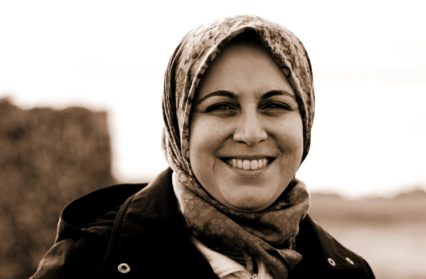Thomas Tyrrell reviews the debut poetry collection Inhale/Exile by Abeer Ameer, a poet drawing on her Iraqi heritage living to write about her life in Cardiff.
Abeer Ameer is one of the successes of the Cardiff poetry scene, and many occasional visitors to Roath Writers, First Thursday and Where I’m Coming From will remember the small figure in the headscarf with the shy but dazzling dentist’s smile. Like many quiet people, Ameer has lived a life of great tragedy and great romance, and both these things enrich her vibrant first collection, Inhale/Exile.
Take, for example, the portrait of a nervous Iraqi groom at Heathrow airport, awaiting the long-deferred arrival of his bride. Confused, she lingers at Charles de Gaulle airport in Paris, and has to be shepherded onto the London plane by kindly strangers. Then, a last minute hitch at the border:
Announcement. The groom is summoned to Immigration.
Your wife says you do drugs.
He realises at that moment he should have taught his bride
the correct English for pharmacy student.
The poem’s punchline also has the pathos of being a potentially visa-wrecking misunderstanding, and this kind of conflict gives depth to Ameer’s lighter poems and brings flashes of light to the darker material. One of the strongest poems of Inhale/Exile, ‘Bystander’, performs one of poetry’s most useful functions in striking the encrustations of banality from an act of evil, and making it stand out plain and clear.
Also known as collateral damage.
The usual story for his type:
minding his own business
tending to his pomelos and pomegranates
and watering his carnations. His granddaughter watches
as he spreads fig leaf sap to cure his psoriasis.
Guided missiles
don’t show the usual signs of guidance.
They don’t shout Hallelujah,
they don’t clap in praise of the Lord
and they don’t quietly come seeking
a Bodhi tree under which to sit cross-legged
to reach Enlightenment.
In the dry language of the after-action report, our unnamed civilian is a universal victim. The poem restores his unique, human circumstances to him, while the godless inhumanity of the murder weapon stands out in vivid contrast. Only Ameer, whose dental training makes her alert to the needs and ills of the body, could have given us that detail of the ‘psoriasis’, while the second verse would have been impossible without the generosity of her religious spirit that underpins the collection.
The less successful poems of Inhale/Exile betray, in their clunky formal choices, their origins as workshop prompts. There are a number of sestinas, which are generally an unhappy form for Ameer; they stutter their endwords awkwardly and make limp spaghetti of her normally elegant verse-lines. An erasure poem doesn’t reveal or conceal anything particularly interesting, while an attempt to write a poem in the manner of Edward Thomas makes for an unfortunate stylistic mishmash. ‘Baghdad, 1284 BCE’ needed either a tone of jaunty horror or poignant humanity: instead the lines ‘Mongols beheaded many. / Abassids lost their empire’ are shockingly flat. There are many more atrocities in Iraqi history but, to her credit, Ameer is never as pat as this again. Her natural ear for verse is better revealed in the opening to ‘The Student’, which makes fine use of assonance and half-rhyme.
Early days for the iron fist.
First, they came for the communists
then, for the faithful clerics.
This is the first of a sensitive and touching series of poems focussed on Iraqi professionals, teachers, doctors, bakers, postmen and translators, and their small, perilous acts of resistance to Saddam Hussein’s regime. They’re among the highlights of a collection that’s angry without being cynical, hopeful without being sentimental, and gives us a wholly fresh perspective.
Inhale/Exile by Abeer Ameer is available now from Seren Books.
Thomas Tyrrell has a PhD in English Literature from Cardiff University and has twice won the Terry Hetherington poetry award.












